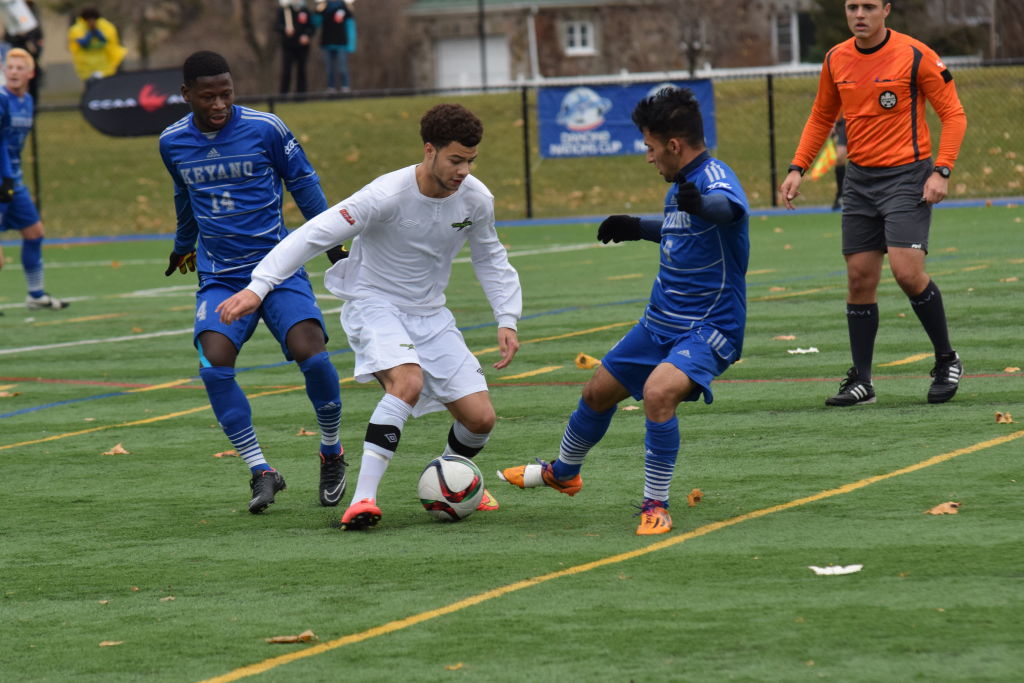The Algonquin Thunder men’s soccer team is bringing home a medal from the Canadian College Athletic Association (CCAA) national championships for the first time since 2008.
The Thunder won three of four games to capture bronze in the four-day, eight-team tournament played at Champlain College-Saint Lambert in Montreal from Nov. 11 to Nov. 14.
Humber had their number
Thunder played rivals Humber Hawks in the Nov. 12 national semi-final just a few weeks after the Hawks had beaten Algonquin 3-0 in an ill-tempered provincial championship final that saw the referee brandish 11 yellow cards.
“There is definitely a common hate between the two teams,” said Thunder captain and centre midfielder Stephane Emard.
The two teams had met in the last three Ontario College Athletic Association finals. With the stakes even higher on the national stage, the bad blood predictably spilled over.
Both teams were toeing the line throughout, as hard tackles led to multiple injury delays and player clashes. The game was played in heavy wind and rain. Put together, it made for a sloppy contest with few scoring chances.
After a scoreless first half, a clumsy tackle just outside the 18-yard box made for the second yellow card of the game for defender Kieran Spring, reducing Algonquin to ten men two minutes into the second half.
A few minutes later, Algonquin was late to react to a Humber corner kick played short before midfielder Jesse Assing headed an in-swinging cross home.
Following the goal, Humber player Josh Paredes-Procter taunted a vocal group of Algonquin supporters and inactive team members, one of whom invited Paredes-Procter to fight, prompting a warning from a CCAA sideline official.
Algonquin failed to muster a shot on goal in the second half, falling out of gold medal contention with a 1-0 loss.
Algonquin lost only twice in the entirety of their 2015 season – both to Humber, who went on to win national gold in a shootout over North Vancouver side Capilano.
Taking home the bronze
After falling just short of a championship final berth, the Thunder moved into the consolation bracket of the tournament and played a qualifying game against Albertan side Keyano College for a spot in the bronze medal final.
Keyano was ranked first in the nation by the CCAA as of Oct. 28 but were upset by seventh-ranked Kwantlen in their opening game of the tournament.
The Thunder opened the scoring just four minutes into the game off a redirect by Alex Asmis on an Algonquin corner kick.
Keyano controlled possession for much of the game, but the Thunder preserved their early lead through to the final whistle thanks to stout defending and a few key saves late in the game by goalkeeper Kyle Maharaj.
In the bronze final, Algonquin came out with a dominant first half against the host team, Champlain College St. Lambert.
The Thunder were rewarded after left back Saverio Panucci’s stunning strike from 20 yards out found the top left corner of the net.
Just ten minutes later, centre back Issac Johnson headed home the 2-0 goal on a set-play executed to perfection off a free kick 25 yards out.
Saint Lambert pressed in the second half in search of a goal, but Algonquin held sturdy in defence en route to a 2-0 victory and Algonquin’s first bronze medal in its CCAA history.
A grueling four-day battle
The OCAA introduced an expanded schedule of ten games for the 2015 men’s soccer season, up from eight the year previous. For Algonquin, the schedule included three sets of back-to-back weekend games.
At the national tournament, the games grow in intensity and the schedule becomes all the more taxing.
By virtue of playing a consolation qualifier for the right to compete for bronze, the Thunder wound up playing four 90-plus minute games in just four days. All told, the Thunder played seven games in 17 days between the national and provincial tournaments.
Come the bronze medal qualification game against Keyano, the team had just three healthy substitutes on the bench due to a collection of injuries.
The majority of the team slumped to the ground exhausted after the final whistle.
“The team is pretty beat up,” said head coach Mike Gagliano. “It takes a lot of courage to give the effort they gave.”
Emard called it, “one of the most physically gruelling weeks of my life.”
In response to criticism on Twitter surrounding the physical toll the tournament’s format exacts on its competing athletes, the CCAA responded, “this is how we’ve done it since 1984.”



